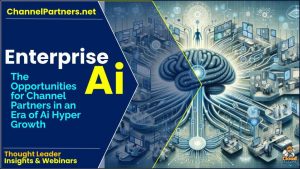 Artificial Intelligence (AI) is revolutionizing industries across the world and one of the key areas where AI is making a significant impact is in data centers.
Artificial Intelligence (AI) is revolutionizing industries across the world and one of the key areas where AI is making a significant impact is in data centers.
In the feature video Wes Cummins, Applied Digital Co-Founder, Chairman & CEO, explains how the rise in AI is posing challenges to data centers. He joins David Westin on “Wall Street Week” daily.
The trend is fuelling a massive investment into the sector. The growth of AI creates unprecedented demand for global data centers, and Data Centers are the new Billion-Dollar AI Gamble.
The world’s largest private equity firm, Blackstone, is setting its eyes on AI data centers, and it is on a quest to become the country’s most sought-after landlord to Big Tech and the world’s biggest by power capacity.
This demand will drive growth in component part industries, like this power capacity. For example nuclear energy has been a hot topic in investors’ minds after Microsoft (MSFT) and Constellation Energy (CEG) announced an agreement to restore a dormant nuclear power plant to power the tech company’s AI and cloud data centers.
With the growing demands of AI, data center storage capacity is expected to grow from 10.1 zettabytes in 2023 to 21.0 ZB in 2027. Generative AI’s greater energy requirements – ranging from 300 to 500+ megawatts – will also require more energy efficient designs and locations.
Trends Shaping the AI Data Centers Market
- Increased Demand for Data Processing Power: With the exponential growth of data generated by businesses and consumers, there is a rising demand for data processing power. AI Data Centers leverage machine learning algorithms to analyze and process vast amounts of data at lightning speed.
- Enhanced Security Measures: AI technologies are being used to strengthen cybersecurity measures in data centers. AI-powered security systems can detect and respond to threats in real-time, ensuring the protection of sensitive data.
- Energy Efficiency: AI Data Centers are designed to optimize energy consumption and reduce carbon footprints. By using AI algorithms to manage cooling systems and power usage, data centers can operate more efficiently and sustainably.
- Predictive Maintenance: AI algorithms enable predictive maintenance in data centers, allowing operators to identify potential issues before they escalate into major problems. This proactive approach helps minimize downtime and improve overall operational efficiency.
Market Analysis and Growth Projections
The global AI Data Centers market is projected to experience significant growth in the coming years. According to research reports, the market size is expected to reach billions of dollars by 2025, driven by the increasing adoption of AI technologies in data centers.
- Market Segmentation: The AI Data Centers market can be segmented based on deployment type (cloud-based, on-premises), application (IT & telecom, healthcare, BFSI, retail, others), and region (North America, Europe, Asia Pacific, Latin America, Middle East & Africa).
- Key Players: Leading companies in the AI Data Centers market include IBM, NVIDIA, Intel, Google, and Microsoft. These players are investing heavily in AI research and development to stay ahead in the competitive landscape.
- Market Drivers: The increasing adoption of cloud computing, the proliferation of IoT devices, and the need for real-time data processing are key drivers fueling the growth of AI Data Centers.
- Challenges: Despite the promising growth prospects, challenges such as data privacy concerns, regulatory compliance, and high initial investment costs pose hurdles for the widespread adoption of AI Data Centers.
Conclusion
In conclusion, the emergence of AI Data Centers represents a significant advancement in the data center industry. With the integration of artificial intelligence technologies, data centers are becoming more efficient, secure, and sustainable. As the market continues to evolve, businesses that leverage AI Data Centers will gain a competitive edge in managing and processing data effectively.



